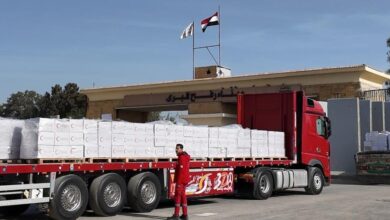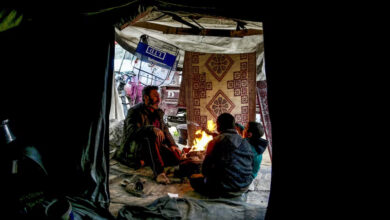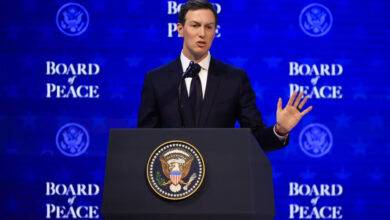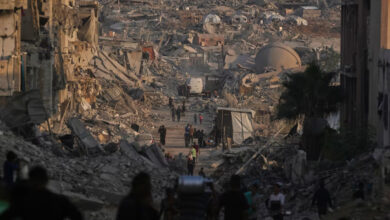In 2008, stifled by an Israeli blockade exacerbated by a weak Egyptian position, Gazans barged through Egypt’s borders to get needed supplies of food and other products.
At the time, some Egyptians sympathized with our brothers in Gaza, while others condemned their act, saying their break-in violated Egypt's sovereignty. In response I published an article in my blog titled “Crossing the lines,” in which I mocked those who were more angered by the Palestinians’ transgression of the borders than they were by their suffering and suppression.
The disagreement between the two camps reflects deeper differences in their understanding of politics. While the first camp views politics as the erection of barriers by authorities who claim to protect the lives of the people and to know what is best for them, the other suppressed camp views it as the continued crossing of the lines defined by authority to open up space for the people to live freely and enjoy dignity.
I just came back from Gaza. I was there as part of the Palestine Festival of Literature (PalFest) touring Palestinian cities. This time, the festival was held in Gaza to express solidarity with its residents against the blockade imposed on them. The Hamas government’s internal security forces told me that any deviation from the preset schedule for the visit would have to be reported to them, even if it were a visit to the supermarket.
I learned from Gazan bloggers that their freedom of expression and movements are closely watched by the Hamas government. Some of them were arrested for content they posted on Facebook, while others were beaten and detained for taking part in marches that were staged without obtaining permission from Hamas, whether the purpose was to end divisions between Fatah and Hamas or to protest deteriorating living conditions.
I heard stories from independent bloggers and leaders from the Popular Front for the Liberation of Palestine about how they were beaten with batons for staging protests in solidarity with the Egyptian and Syrian revolutions and for demonstrating against the local mismanagement of the power outage crisis, for example. Others told me about the intellectual intimidation by the Hamas government in Gaza and the Fatah government in the West Bank, which led to the confiscation of opposition papers.
Other youth were wary of criticizing practices by the Hamas government that undermine their freedom. They said they did not want to deepen the Palestinian rift, emphasizing that they support Hamas’ resistance against Israel as opposed to Fatah’s more lenient position on Israeli occupation.
I told them that if the objective of resistance was to gain freedom, then it was by no means logical to give up this same right for the sake of resistance.
That was a summary of the speech I delivered at the closing ceremony of the PalFest held at Dar al-Basha next to the Omari Mosque in Gaza. Internal security officers were brazenly taking shots of participants, and when a Palestinian friend took a photo of the security guy taking pictures, he snatched the camera from her hand amid our anger and protest.
The light had gone out during the ceremony, and at first I thought the blackout was due to the electricity crisis in Gaza, only to be told by one of the organizers that the security cut it off on purpose and ordered the owner of the place to immediately end the forum.
Security men occupied the place and said we had no permission to hold the forum, even though representatives from the Interior and Culture ministries received us at the Rafah crossing and welcomed us as part of the event. I remember quite well how the Interior Ministry representative said we could move freely and pay visits to whatever places we wanted, including prisons, to see firsthand the advanced status of human rights.
I asked the security guy who seemed to be leading the brigade that stopped the event. “So what came up? This is our closing ceremony and we have been talking for four days at general forums.” He answered, “This is because of your speech, which slandered us and claimed we suppress freedoms.”
But discovering how wrong he was, smiling, he quickly added, “We came to confirm you were right!”
Putting on a more serious tone, he said that he is following our pages on the internet and our criticism of the internal security, and advised us to respect the country hosting us and to refrain from criticizing in an unacceptable way.
While we were on our way to visit Palestinian camps, underground tunnels and buildings demolished by the Israeli occupation, a young man from Rafah told me that the Hamas government was fooling us. Other young men said how the Hamas government intentionally takes foreign delegations on special tours to exhibit how desperate Gaza is, and how oppressive the siege can be. The dire straits of Gaza is an undeniable fact, but he added that the Palestinian government avoids showing these delegations the domestic oppression. The government’s own suppression of the opposition and its mismanagement of crises are kept hidden.
That guy gave us ice cream and said, “This is a gift from the Palestinian people. We’re not dying here. Don’t let the [Palestinian] Authority fool you.”
The ceremony and its interruption by security revealed the double blockade on Gaza. While Israeli occupation imposes an economic blockade on Gaza, the Hamas government abuses its political struggle with Fatah and its resistance to Israeli occupation, and the consequent fear of spies and traitors, to take the residents of Gaza hostage.
I therefore thank the guy from Rafah, both for the ice cream and the advice.
Translated from Al-Masry Al-Youm by Dina Zafer




